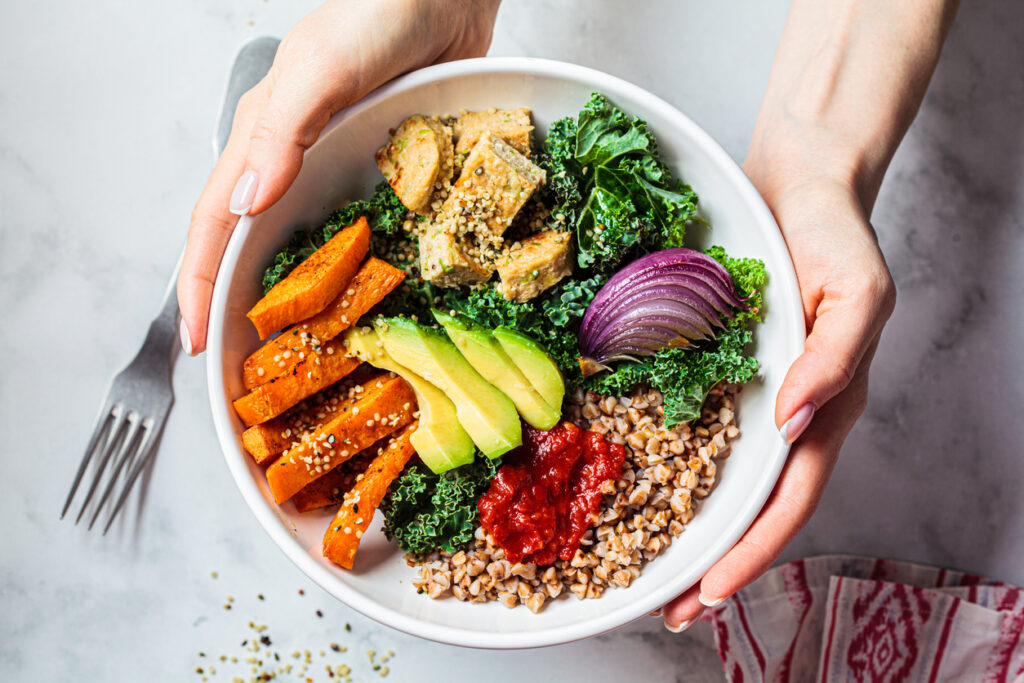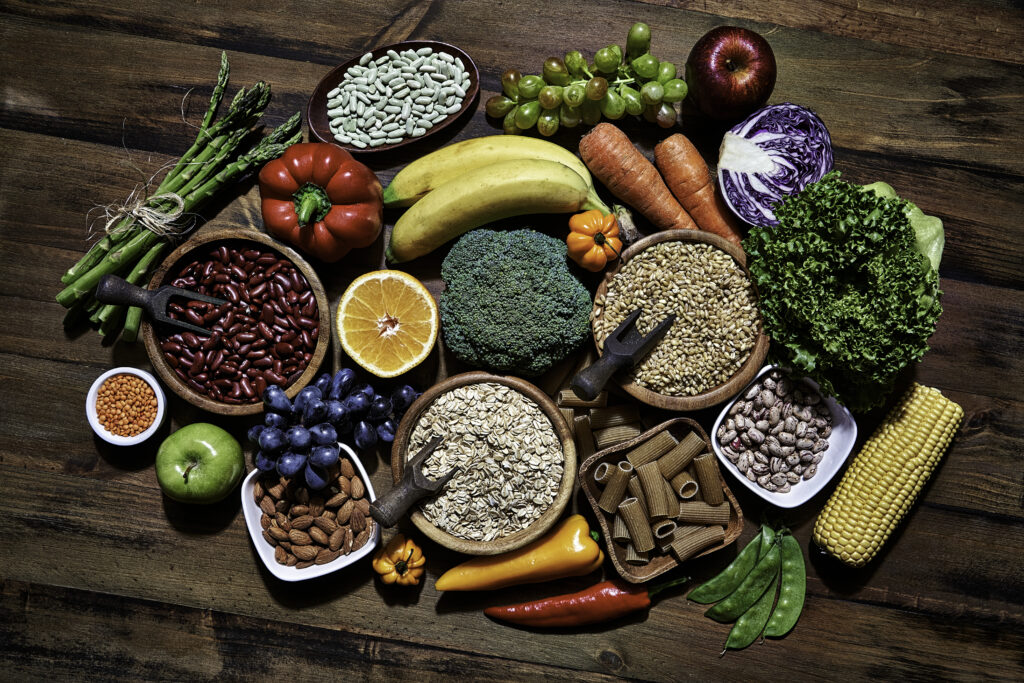
Looking for a way to lose weight and keep it off? A plant-based eating approach may be the way to go. As a registered dietitian, I’ve heard countless stories of people following trendy diets in order to lose a few pounds — only to gain them all back plus more!
But whole food plant-based eating is no fad diet. It’s been around for centuries. And it works, not only to reach a healthier weight naturally without starving yourself, but also to reduce health risks. The plant-based way of eating has deep roots, and it’s gaining momentum for good reason.
Whether you choose vegan, vegetarian, or a more adaptable flexitarian or Mediterranean diet, becoming less of a meat eater and more of a plant eater holds significant health benefits.
What is a Plant Based Diet?
First, let’s quash the common misconception that going plant-based means giving up animal proteins or dairy entirely. It’s an option but not “a rule.”
If you search the Internet, you’ll likely find various definitions about what a plant-based diet is. Many people describe it as vegetarian or vegan. However, research done on the benefits of plant-based eating patterns are based on minimally processed whole foods, including whole grains, fruit, vegetables, legumes, nuts, and seeds with reduced animal products. The more whole plant foods included in the diet, the greater the benefit.
One thing we all can agree on: the American diet could use some improvement. More than a third of Americans struggle with weight and related health conditions.
Whether you’re ready to jump on the plant-based train now or want to learn more before moving forward, it pays to know the whole story. With education comes empowerment. And you’ll soon see, there’s more than one way to go plant based. It’s not a one-size-fits-all approach. Read on to find your own healthy reason to consider increasing your plant intake.
Discover the Top Reasons for Choosing a Plant Based Diet
1. Healthier Weight

Plant-based whole foods are nutrient-dense and have fewer calories than animal proteins and refined carbs. Research suggests that when you increase your intake of plant foods, you naturally lower your calorie intake and increase your consumption of vitamins, minerals and filling dietary fiber. You can eat adequate portions, but you get full on less calories and stay fuller longer – good news if you’re trying to lose weight naturally.
Plant-based eating is one of the few ways to quit yo-yo dieting for good. Higher intake of certain plant compounds called flavonoids and flavonols have been shown to support weight maintenance after weight loss.
2. Reduced Inflammation
Chronic inflammation is the cause of many chronic diseases, including type 2 diabetes, cardiovascular disease, and cancer. Plant foods contain potent antioxidants in the form of polyphenols and other phytonutrients that are vital for preventing cell damage and reducing pro-inflammatory activity in the body.
Go ahead…enjoy all the beautiful colors of a plant-based diet! Color molecules that form more than 2,000 color pigments in plant foods contain antioxidants that neutralize free radicals that damage healthy cells.
3. Better Blood Sugars
Whole, plant-based eating has been shown to improve blood sugar control, helping to prevent, manage, and sometimes reverse insulin resistance, prediabetes, and type 2 diabetes. It’s a balanced approach to a diabetic diet, offering many benefits, including a reduced risk of diabetes complications.
4. Cardiovascular Health
When you swap some animal protein with plant-based protein, you significantly reduce your intake of saturated fat, which is associated with lower cholesterol levels. A minimally processed plant-based diet has also been linked to lower blood pressure levels. These heart health benefits are derived from a higher intake of dietary fiber, unsaturated fatty acids, and phytonutrients.
5. Cancer Prevention

Along with a healthy lifestyle, fiber and cell-protecting antioxidants are big players in cancer prevention. Studies show that a well-balanced, whole food, plant-based diet can help prevent several cancers, including colorectal, breast, prostate, and gastric cancer.
6. Improved Immunity
The array of nutrients found in plant-based foods has long been linked to improved immune system function. Research suggests that vitamins C, E, and b-carotene, the minerals zinc, copper, and selenium, as well as the phenolic compounds present in food of plant origin can strengthen the immune system and protect against both viral illnesses and chronic disease.
7. Healthy Brain
The science says that plant-based eating patterns may improve quality of life by supporting better sleep, reducing likelihood of mental health disorders, and decreasing the rate of age-related memory and cognitive decline.
8. Happy Gut
A healthy gut is vital for your well-being. And for your gut to be healthy, the bacteria that live in your digestive system must have an opportunity to thrive. These friendly bacteria flourish on a diet rich in plant fiber. A happy gut supports improved digestion, regular bowel movements, removal of toxins and pathogens, and a better functioning immune system.
9. Glowing Skin
Eating more fruit and vegetables promotes healthy aging of your skin. The vitamins C, E, and b-carotene, along with phenolic compounds present in plants prevent cell damage, reduce inflammation, and improve elasticity and collagen production.
10. Longevity

Did you know people living in the Blue Zones are known to be among the longest living people in the world? They eat a predominantly plant-based diet. Research on these populations suggests that reducing red meat consumption and eating more whole grains, legumes, nuts, seeds, fruit, and vegetables makes it possible to live a healthy life well into old age.
Keep in mind that living a plant-based lifestyle still means making good choices, because studies show that eating a highly processed plant-based diet decreases lifespan.
3 Easy Ways to Move Plant Forward
Now that you’ve gotten a glimpse into plant-based eating as an essential practice for improving your health and how your body thrives on its nutrients, follow these steps to get started:
1. Seek Inspiration
Start by browsing healthy plant-based recipes for inspiration and begin collecting and storing your favorites in an “inspirational file.” These delicious recipes will get you started:
Recipes from the Plant-Powered Dietitian
Flexitarian Recipes for Beginners by Eating Well
Healthy Mediterranean Recipes by Eating Well
2. Try Meatless Mondays
Go gradually. Choose one day of the week to go meatless. Make it a family affair and decide together. Try a new plant-based food or recipe weekly and increase plant-based meal frequency as you feel more comfortable. Don’t forget to go to your inspirational file for creative ideas!
3. Meet with a Registered Dietitian
The elements of a whole food, plant-based diet are highly beneficial for losing weight, preventing and treating diabetes, and warding off heart disease and cancer.
If you’re ready to free yourself from the burden of the average American diet and want to learn more about how a healthy plant-based diet can fit into your life, let’s meet. Together we will find what works for you. Please check out my bio to learn more about my approach and philosophy.





0 Comments